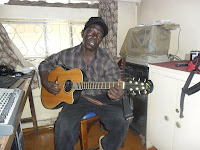 |
| The Man Gicheha |
Early Musical Starts
From a young age, growing
up in Gatukuyu, Gatundu North, Thika County Gicheha desired to sing
and music was inherent in him. “I’d listen to a song on radio
and sing it again,” he said then, Kenya Broadcasting Corporation
(KBC) had the only radio station. He carried on his musical pursuits
to high school where he learned to play the guitar. After high
school, he joined Kenya Polytechnic to study Graphic Arts and Print
Management course which he admits parents selected it for him.
While in college in 1998,
Gicheha desired to record music, and the opportunity came through a
former classmate who introduced him to a producer he worked for.
After he sang the producer sensed his talent and signed him without
charges. The arrangement was, after the album was released, they
would share the proceeds. Looking back, Gicheha admits the contract
exploited him financially. Nevertheless, he released his first album
called “Ngoma aroiga mehia metwo maendeleo.”
The debut album gave him a
name in Kikuyu music scene but little money to show for it. “I was naive to the workings of music production,” Gicheha said. In KBC’s
Kikuyu Program segments, its songs were played and he got invited to
sing on KBC TV’s Joy Bringers Program. The experience he had with
the producer made him opt to produce his next album in 2002. In the
nearly 4 year away from recording he joined a gospel band which
matured his voice and musical abilities.
Musical Inspirations
 |
| The Musician |
As a born again Christian,
his music ideas are inspired by GOD’s power, preaching and His
Biblical Word. He is also careful what he listens to. “If you
listen to garbage your output will be it,” said Gicheha. He also
believes a musician ought to live and believe what he sings. He
cites the song ‘Hurutira mwaki wa roho’ (fan your spiritual
flame) whose inspiration came after observing how when cooking
‘Githeri’ (maize and beans), one fans the fire until it’s
cooked. The album’s message resonated with many listeners and has
sold almost 20,000 copies to date.
He composed it from a
spiritual perspective. “Whatever vision you have in life you got
to fan it until it comes to pass,” observes Gicheha. He uses his
guitar to compose melodies but some come randomly to his mind. “I
could be walking and a melody comes,” he said. In such instances he
records it with his phone. He also listens to diverse African music
genres from regions like Congo, West Africa, South Africa and Western
Music. Still he considers African music as very rich.
Gicheha musical influences
have been Joseph Kamaru, Wahome wa Maingi, Gregory Isaacs, Lucky Dube
and others. From these tastes, it inspires tunes in line with his
musical vision. Over a time period he crafts the tune, chorus and
stanzas by meditating, singing but not writing them down. When
satisfied he records. “I prefer a random process of composing its
fresh,” said Gicheha.
Take on Music Piracy
In his years in Kikuyu Gospel Music, money has never been the motivator considering piracy is
endemic today. He cautions budding gospel musicians not to venture
the industry with a business mindset or they risk disappointment.
“It’s a ministry and sometimes your investment, may not
correspond with your output and you can give up,” said Gicheha. He
says relying on GOD’s faithfulness is the key to longevity in
gospel music, knowing in due time you will be compensated by Him.
Consequently, piracy
doesn’t keep him awake at night if anything, he sees it as a
blessing in disguise as his music reaches more grassroots folks. To
Gicheha, music pirates are thieves God will punish but prays for
grace to continue in gospel music, regardless. “They can’t stop
me from attaining my vision which I’m drawing near to,” he said.
His vision is to sing his Kikuyu gospel music internationally and
believes music regardless of dialect is a universal language. “I
will spread the gospel through my music to encourage many diverse
races of people,” he said.
As a largely self taught
guitarist, he sings live or via playback depending on resources where
he is invited to perform. Nevertheless, he loves live performances
due to their authenticity. In all his recordings, he plays the guitar
riffs in them. The person who taught Gicheha to play guitar was in a
hurry and drew the C Chord on a paper. From that, Gicheha learned by
practicing for two hours daily.
Acting Career and
Challenges
 |
| Emcee and Musician |
Since class 6 Gicheha has
acted. He appears in Kameme FM’s popular radio play ‘Micii ni
Ndogo’ as the eccentric Nyari, Citizen TV’s Machachari and KBC’s
soap opera Rosa. He also Emcees events and every weekend he is
booked. “Some I turn down,” he said. He urges Diaspora fans to
invite him for shows to support Kikuyu music industry. “So when we
come back we have money to record more,” He said. “Our language
one of the greatest in Africa,” added Gicheha.
In Kenya, Gicheha’s two
most defining shows have been at Harrison Nganga’s CFF Church and
ACK Gachie Church where he performed with fellow musician Kamau
Karongo. Per invite he makes from Sh10, 000 to Sh60, 000 and admits
music pays his bills and lives comfortably.
Other challenges Gicheha
has faced in his music career have been getting his videos to play on
Kenyan TV stations. “But people love my music and I thank God,”
he said. He also guides budding musicians by directing them to the
best studios for recording and assisting them in the process. You can reach him on his email johnnjuguna.gicheha@yahoo.com or call him on +254 721 340 901
Kikuyu Musicians Media Copyright





